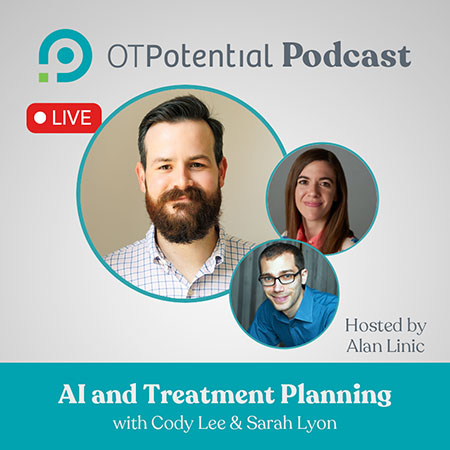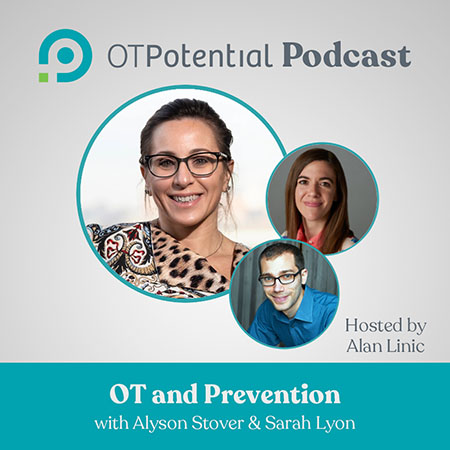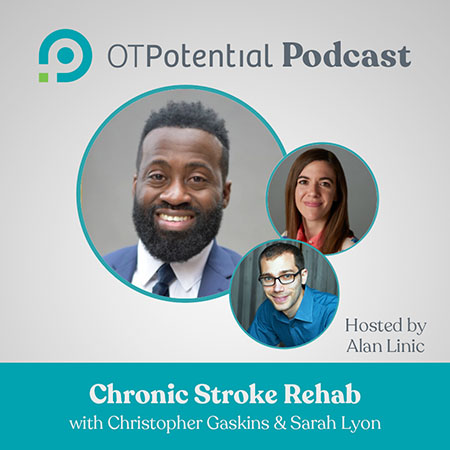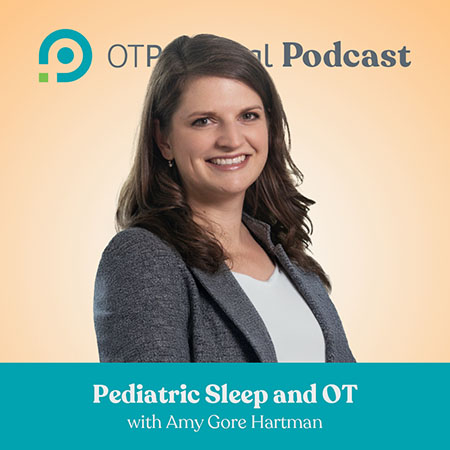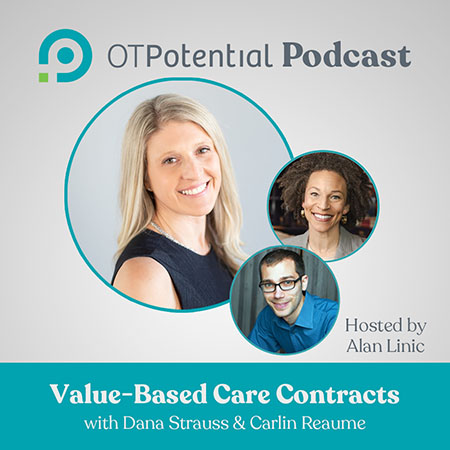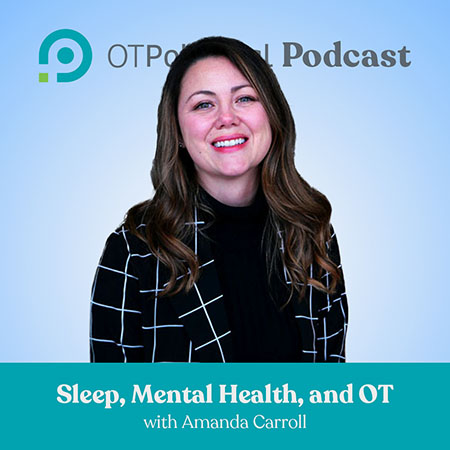Earn 1 hour of continuing education by joining OT Potential after taking this course.
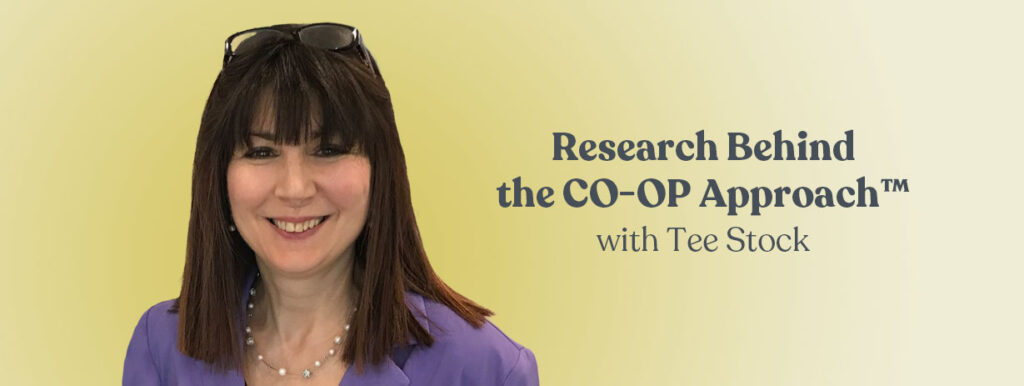
Listen: Apple | Spotify | Google
If you haven’t been following the exciting research behind the CO-OP Approach™, this episode is for you.
CO-OP stands for Cognitive Orientation to (Daily) Occupational Performance. This is a trademarked approach with a formal certification program, so we won’t be teaching the actual method. However, we’ll be discussing the research behind the CO-OP Approach™, as well as some ways it can impact your practice.
We’ll explore the primary research article, where the CO-OP Approach™ is performed by OTs in a group setting. You’ll see its impact on “body function, activity, AND participation,” and you’ll be pleased to learn that the researchers determined the approach works 🙂
After spending time in the article, we will be joined by Tee Stock, OTR/L, OTD, MS, MBA. Tee owns her own practice providing pediatric therapy in the home, and she is also certified in the CO-OP Approach™. She and I will discuss the research and practical implications for OTs, so you can gain useful takeaways for your own practice.
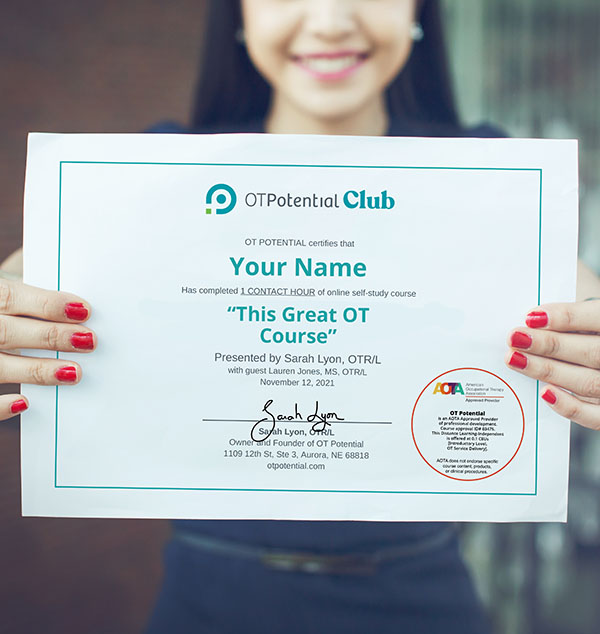
Earn 1 hour of continuing education
1. Listen to the podcast for free.
2. Sign up for the OT Potential Club.
3. Pass the quiz and download your certificate!
Primary Research Explored
When you log in, be sure to check out the OT Potential Club’s written breakdown of the following research article. Then, share your questions and thoughts with fellow practitioners.
Supplementary materials
Here are the supplementary materials we mentioned in the episode
- ICAN CO-OP (The official website of the CO-OP Approach™)
- Recommended Reading via the ICAN COOP website
- New CO-OP research via Google Scholar
Assessments
- Child Occupational Self Assessment (COSA)
- Canadian Occupational Performance Measure (COPM)
- Goal Attainment Scaling (GAS)
- Movement Assessment Battery for Children – Second Edition (MABC-2)
- Pediatric Activity Card Sort (PACS)
- Perceived Efficacy and Goal Setting System (PEGS)
- Performance Quality Rating Scale (PQRS)
Secondary Research
- Efficacy of the cognitive orientation to Daily Occupational Performance (co-op) approach with and without parental coaching on activity and participation for children with developmental coordination disorder: A randomized clinical trial
- Effectiveness of paediatric occupational therapy for children with disabilities: A systematic review
Learning Objectives
- You will be able to identify outcomes measures utilized to determine the effectiveness of the CO-OP Approach™.
- You will be able to recognize the limitations of the research behind the CO-OP Approach™.
Agenda
Intro (5 minutes)
Breakdown and analysis of journal article (10 minutes)
- What is the CO-OP Approach™?
- Why did the authors choose to focus on “body function, activity, and participation?”
- What was the goal of this paper?
- What were the authors’ methods?
- What outcome measures were used?
- What were the results?
- Discussion and conclusion
- Takeaways for OT practitioners
Discussion on practical implications for OTs (with guest Tee Stock) (45 minutes)
- Tell us the story of how you found OT- and then how you found the CO-OP Approach™.
- What was your initial impression of the article?
- Can you tell us about your experience getting certified in the CO-OP Approach™?
- What do you look for in a client to consider using the CO-OP Approach™ with them?
- If you decide to use the CO-OP Approach™ as an intervention, can you tell us what an evaluation might look like?
- Then, what might the intervention look like?
- In your experience, how have kids and their families reacted to the CO-OP method?
- In your opinion, which therapists are a good fit for further training in CO-OP?
- Did reading this article make you think differently about how you might approach CO-OP sessions in the future?
- How has being trained in the CO-OP method made you think differently about your overall OT care?
- If we have extra time: What research questions would you like to see answered about the CO-OP method in the future?
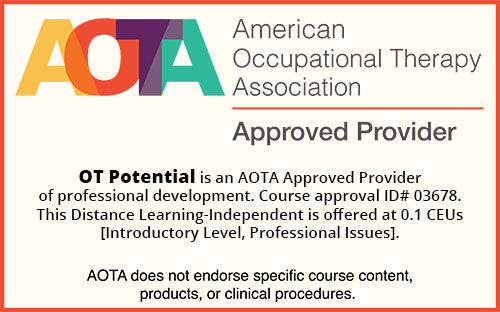
Instructional Methods/Registration/Special Needs Requests/Cancellation Policy
This course is an independent/self-study course delivered via podcast on iTunes, Spotify, Google Play & more.
If you need accommodations to take this course, please contact us and we will address your needs on an individual basis.
If we cancel a promoted course, event, live stream, or any other paid CEU offering prior to release, and you subscribe explicitly for said offering, you are eligible for a full refund if you did not complete and earn any other CEU quizzes or certificates during your subscription.
If a live webinar is cancelled that you signed up for, our system will automatically generate an email to you and if possible, we will inform you of the rescheduled date. Our most current webinar schedule will be found at: otpotential.com/live-ot-ceu-webinars.
Course Completion Requirements
In order to receive a certificate for this course, you must first participate in the podcast/webinar in its entirety. Then, you will need to take the quiz that will accompany the course and earn 75% or higher. If you pass, a certificate will be automatically generated and sent to your email. Quizzes for live (distance learning–interactive) webinars must be completed within 3 days of completing the webinar.
Target Audience/Educational Level
Our target audience is occupational therapy practitioners who are looking to learn about the CO-OP Approach™. The educational level is introductory.
Financial and Non-financial Disclosures
It is the policy of OT Potential to disclose any financial and non-financial interest the provider or instructor may have in a product or service mentioned during an activity. This is to ensure that the audience is made aware of any bias of the speaker.
We here at OT Potential have no financial stake in this topic. Our guest, Tee Stock, has no financial interest in this topic to disclose.
Speakers
Tee Stock, OTR/L, OTD, MS, MBA:
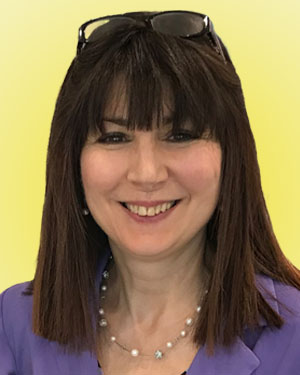
Tee Stock has been an occupational therapist since 1998, specializing in school and home-based practice. She became a faculty member at MGHIHP in 2019 and teaches in their OT program. She has experience working with schools, families, and other service providers.
Dr. Stock completed her Master of Occupational Therapy at Tufts University in 1998 and her Doctorate in Occupational Therapy at Quinnipiac University in 2017. Dr. Stock conducted her doctoral research study on postsecondary transition planning and the roles that OTPs have in the process. She also has a Master in Business Administration from Bentley University and recently presented a webinar on OT and entrepreneurship for AOTA. Read full bio.
Sarah Lyon, OTR/L:
Sarah’s passion is helping fellow OT practitioners translate evidence into daily practice. Sarah earned her BA in religion from St. Olaf College, then earned her master’s degree in occupational therapy from New York University in 2011.
Since then, she’s worked in numerous facilities, including a critical access hospital, an acute trauma hospital, and a state inpatient psychiatric hospital. Sarah is the founder/owner of OT Potential. Read more about OT Potential here.
This course was designed to meet your continuing education requirements
We designed the courses in the Club to meet the requirements for “online” and “independent/self-study” courses. To verify the requirements from your specific state (within the US), check out our post, OT Continuing Education Requirements. If you are outside of the United States and have questions, please contact us.
We are proud to be an AOTA Approved Provider and to meet the requirements for your NBCOT renewal.
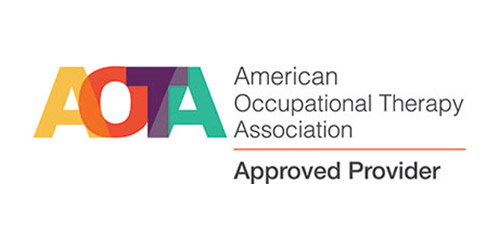
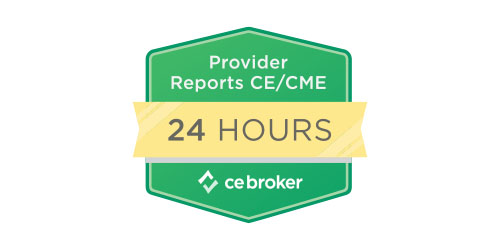
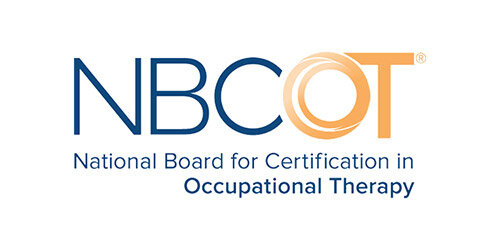
See our other OT courses!
The Research Behind the CO-OP Approach • OT Potential
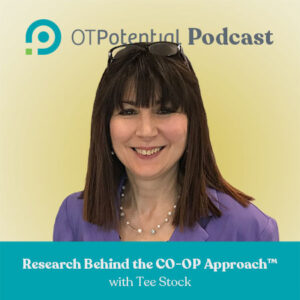
Today, we’ll be covering “The Research Behind the CO-OP Approach™ with Tee Stock.” We’ll look at new research and discuss it with Tee Stock.
Course Provider: Organization
Course Provider Name: OT Potential
Course Provider URL: https://otpotential.com/
Course Mode: Online
Start Date: 2021-12-20
Duration: 01:00:00
Course Type: Subscription
4.73

